 Former Secretary of State Hillary Clinton, pictured in October 2012, has become one of the most powerful people in Washington. Here's a look at her life and career through the years.
Former Secretary of State Hillary Clinton, pictured in October 2012, has become one of the most powerful people in Washington. Here's a look at her life and career through the years.  Before she married Bill Clinton, she was Hillary Rodham. Here, Rodham talks about student protests in 1969, which she supported in her commencement speech at Wellesley College in Wellesley, Massachusetts.
Before she married Bill Clinton, she was Hillary Rodham. Here, Rodham talks about student protests in 1969, which she supported in her commencement speech at Wellesley College in Wellesley, Massachusetts. 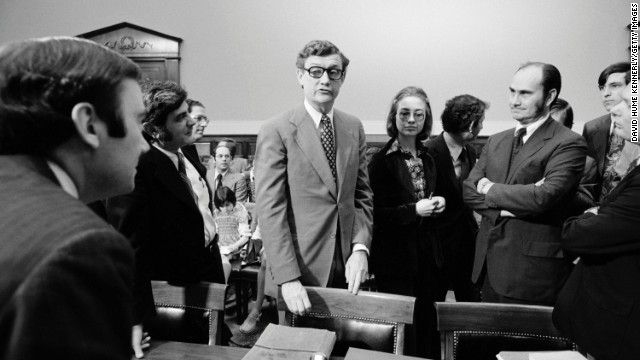 Rodham, center, a lawyer for the Rodino Committee, and John Doar, left, chief counsel for the committee, bring impeachment charges against President Richard Nixon in the Judiciary Committee hearing room at the U.S. Capitol in 1974.
Rodham, center, a lawyer for the Rodino Committee, and John Doar, left, chief counsel for the committee, bring impeachment charges against President Richard Nixon in the Judiciary Committee hearing room at the U.S. Capitol in 1974.  Arkansas Gov. Bill Clinton helps first lady Rosalynn Carter on a campaign swing through Arkansas in June 1979. Also seen in the photo is Hillary Clinton, center background.
Arkansas Gov. Bill Clinton helps first lady Rosalynn Carter on a campaign swing through Arkansas in June 1979. Also seen in the photo is Hillary Clinton, center background.  Bill Clinton embraces his wife shortly after a stage light fell near her on January 26, 1992. They talk to Don Hewitt, producer of the CBS show "60 Minutes."
Bill Clinton embraces his wife shortly after a stage light fell near her on January 26, 1992. They talk to Don Hewitt, producer of the CBS show "60 Minutes."  With Hillary, Democratic presidential candidate Bill Clinton waves to the crowd at his victory party after winning the Illinois primary on March 17, 1992.
With Hillary, Democratic presidential candidate Bill Clinton waves to the crowd at his victory party after winning the Illinois primary on March 17, 1992.  Al Gore, Tipper Gore, Bill Clinton and Hillary Clinton wave to supporters at the Chautauqua Institution in Chautauqua, New York, after they gave speeches on family values on August 23, 1992.
Al Gore, Tipper Gore, Bill Clinton and Hillary Clinton wave to supporters at the Chautauqua Institution in Chautauqua, New York, after they gave speeches on family values on August 23, 1992.  Clinton gestures at a campaign rally November 3, 1992, in Denver. After taking office, President Clinton chose his wife to head a special commission on health care reform, the most significant public policy initiative of his first year in office.
Clinton gestures at a campaign rally November 3, 1992, in Denver. After taking office, President Clinton chose his wife to head a special commission on health care reform, the most significant public policy initiative of his first year in office.  Bill and Hillary Clinton have a laugh together on Capitol Hill in 1993.
Bill and Hillary Clinton have a laugh together on Capitol Hill in 1993. 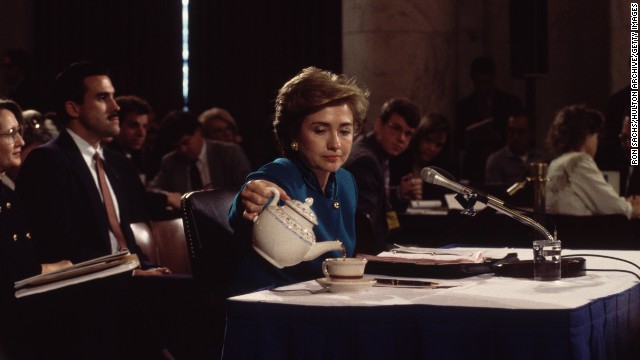 Clinton pours herself a cup of tea in 1993 while testifying to the Senate Education and Labor Committee about health care reform.
Clinton pours herself a cup of tea in 1993 while testifying to the Senate Education and Labor Committee about health care reform.  Clinton speaks at George Washington University on September 10, 1993, in Washington during her husband's first term.
Clinton speaks at George Washington University on September 10, 1993, in Washington during her husband's first term.  Clinton waves to the media on January 26, 1996, as she arrives at federal court in Washington for an appearance before a grand jury. The first lady was subpoenaed to testify as a witness in the investigation of the Whitewater land deal in Arkansas.
Clinton waves to the media on January 26, 1996, as she arrives at federal court in Washington for an appearance before a grand jury. The first lady was subpoenaed to testify as a witness in the investigation of the Whitewater land deal in Arkansas.  Hillary Clinton looks on as President Clinton discusses the Monica Lewinsky scandal in the Roosevelt Room of the White House on January 26, 1998.
Hillary Clinton looks on as President Clinton discusses the Monica Lewinsky scandal in the Roosevelt Room of the White House on January 26, 1998.  Hillary and Bill Clinton arrive at Foundry United Methodist Church on August 16, 1998, in Washington. He became the first sitting president to testify before a grand jury when he testified via satellite about the Lewinsky matter.
Hillary and Bill Clinton arrive at Foundry United Methodist Church on August 16, 1998, in Washington. He became the first sitting president to testify before a grand jury when he testified via satellite about the Lewinsky matter.  Clinton shakes hands during a St. Patrick's Day parade in the Sunnyside neighborhood of Queens, New York, on March 5, 2000.
Clinton shakes hands during a St. Patrick's Day parade in the Sunnyside neighborhood of Queens, New York, on March 5, 2000.  Clinton waves to the crowd as she arrives on the stage at the Democratic National Convention on August 14, 2000, in Los Angeles.
Clinton waves to the crowd as she arrives on the stage at the Democratic National Convention on August 14, 2000, in Los Angeles.  Clinton campaigns for a Senate seat October 25, 2000, at Grand Central Station in New York.
Clinton campaigns for a Senate seat October 25, 2000, at Grand Central Station in New York.  Hillary Clinton is sworn in as a senator of New York in a re-enactment ceremony with, from left, President Clinton, nephew Tyler, daughter Chelsea, brother Hugh Rodham, mother Dorothy Rodham and Vice President Al Gore on January 3, 2001, in Washington.
Hillary Clinton is sworn in as a senator of New York in a re-enactment ceremony with, from left, President Clinton, nephew Tyler, daughter Chelsea, brother Hugh Rodham, mother Dorothy Rodham and Vice President Al Gore on January 3, 2001, in Washington.  Andrew Cuomo, Eliot Spitzer and Clinton celebrate with a crowd of Democratic supporters after their wins in various races November 7, 2006, in New York.
Andrew Cuomo, Eliot Spitzer and Clinton celebrate with a crowd of Democratic supporters after their wins in various races November 7, 2006, in New York. 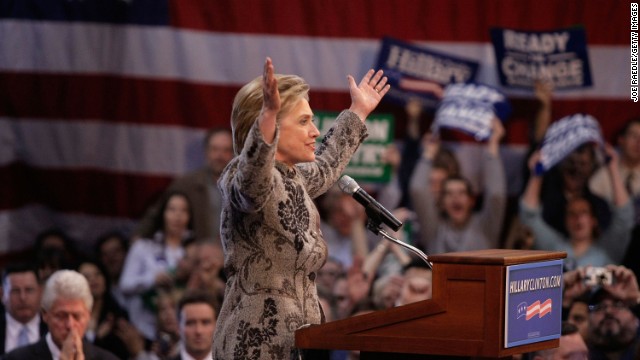 Clinton speaks during a post-primary rally on January 8, 2007, at Southern New Hampshire University in Manchester, New Hampshire.
Clinton speaks during a post-primary rally on January 8, 2007, at Southern New Hampshire University in Manchester, New Hampshire.  The Clintons pay a visit to the 92nd annual Hopkinton State Fair in Contoocook, New Hampshire, on September 2, 2007.
The Clintons pay a visit to the 92nd annual Hopkinton State Fair in Contoocook, New Hampshire, on September 2, 2007.  Clinton speaks at a campaign rally September 2, 2007, in Portsmouth, New Hampshire. She was running for the Democratic presidential nomination.
Clinton speaks at a campaign rally September 2, 2007, in Portsmouth, New Hampshire. She was running for the Democratic presidential nomination.  Clinton addresses a question during a debate with other Democratic presidential candidate at Dartmouth College in Hanover, New Hampshire, on September 26, 2007. Also pictured are U.S. Rep. Dennis Kucinich of Ohio, left, and former U.S. Sen. Mike Gravel of Alaska.
Clinton addresses a question during a debate with other Democratic presidential candidate at Dartmouth College in Hanover, New Hampshire, on September 26, 2007. Also pictured are U.S. Rep. Dennis Kucinich of Ohio, left, and former U.S. Sen. Mike Gravel of Alaska.  Felipe Bravo, left, and Christian Caraballo are covered with Hillary Clinton stickers in downtown Manchester, New Hampshire, on January 8, 2008.
Felipe Bravo, left, and Christian Caraballo are covered with Hillary Clinton stickers in downtown Manchester, New Hampshire, on January 8, 2008.  Clinton campaigns in Council Bluffs, Iowa, with her daughter, Chelsea, on January 1, 2008, two days ahead of the January 3 state caucus.
Clinton campaigns in Council Bluffs, Iowa, with her daughter, Chelsea, on January 1, 2008, two days ahead of the January 3 state caucus. 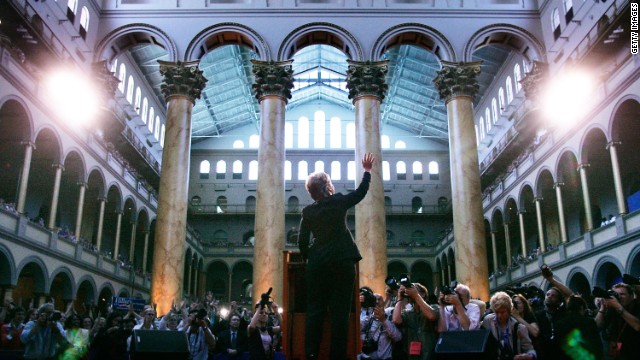 Clinton waves as she speaks to supporters at the National Building Museum on June 7, 2008, in Washington. After pulling out of the presidential race, Clinton thanked her supporters and urged them to back Barack Obama to be the next president of the United States.
Clinton waves as she speaks to supporters at the National Building Museum on June 7, 2008, in Washington. After pulling out of the presidential race, Clinton thanked her supporters and urged them to back Barack Obama to be the next president of the United States.  Obama and Clinton talk on the plane on their way to a Unity Rally in Unity, New Hampshire, on June 27, 2008.
Obama and Clinton talk on the plane on their way to a Unity Rally in Unity, New Hampshire, on June 27, 2008.  Obama watches Clinton address the Democratic National Convention on August 26, 2008. The two endured a long, heated contest for the 2008 nomination.
Obama watches Clinton address the Democratic National Convention on August 26, 2008. The two endured a long, heated contest for the 2008 nomination.  Sen. Charles Schumer, left, looks toward Secretary of State designate Clinton as Senate Foreign Relations Committee chairman Sen. John Kerry, center, looks on during nomination hearings January 13, 2009, on Capitol Hill.
Sen. Charles Schumer, left, looks toward Secretary of State designate Clinton as Senate Foreign Relations Committee chairman Sen. John Kerry, center, looks on during nomination hearings January 13, 2009, on Capitol Hill.  Clinton testifies during her confirmation hearing for secretary of state on January 13, 2009, in Washington.
Clinton testifies during her confirmation hearing for secretary of state on January 13, 2009, in Washington.  Clinton, as secretary of state, dances with a local choir while visiting the Victoria Mxenge Housing Project in Philippi, a township on the outskirts of Cape Town, South Africa, on August 8, 2009.
Clinton, as secretary of state, dances with a local choir while visiting the Victoria Mxenge Housing Project in Philippi, a township on the outskirts of Cape Town, South Africa, on August 8, 2009.  Clinton looks through binoculars toward North Korea during a visit to an observation post July 21, 2010, at the demilitarized zone separating the two Koreas.
Clinton looks through binoculars toward North Korea during a visit to an observation post July 21, 2010, at the demilitarized zone separating the two Koreas.  Clinton walks up the steps to her aircraft as she leaves a meeting of the Association of Southeast Asian Nations on July 23, 2010, in Hanoi, Vietnam.
Clinton walks up the steps to her aircraft as she leaves a meeting of the Association of Southeast Asian Nations on July 23, 2010, in Hanoi, Vietnam.  Hillary and Bill Clinton pose on the day of their daughter's wedding to Marc Mezvinsky on July 31, 2010, in Rhinebeck, New York.
Hillary and Bill Clinton pose on the day of their daughter's wedding to Marc Mezvinsky on July 31, 2010, in Rhinebeck, New York. 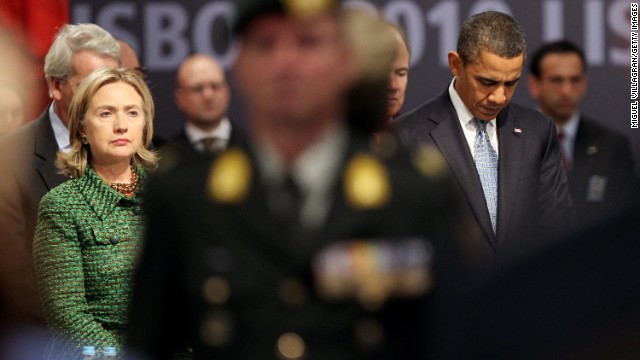 U.S. President Barack Obama and Clinton observe a moment of silence before a NATO meeting November 19, 2010, in Lisbon, Portugal.
U.S. President Barack Obama and Clinton observe a moment of silence before a NATO meeting November 19, 2010, in Lisbon, Portugal.  Clinton listens as Turkish Foreign Minister Ahmet Davutoglu makes a brief statement November 29, 2010, before a bilateral meeting at the State Department in Washington.
Clinton listens as Turkish Foreign Minister Ahmet Davutoglu makes a brief statement November 29, 2010, before a bilateral meeting at the State Department in Washington. 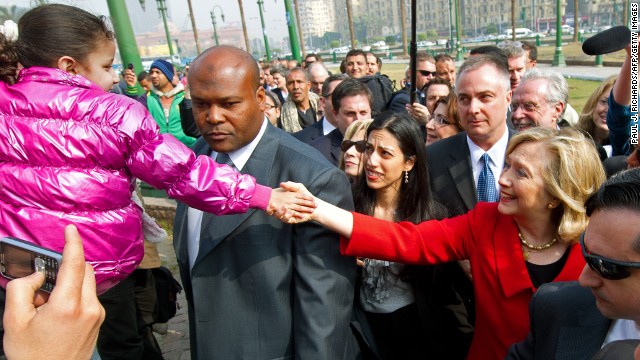 Clinton shakes hands with a child during an unannounced walk through Tahrir Square in Cairo on March 16, 2011.
Clinton shakes hands with a child during an unannounced walk through Tahrir Square in Cairo on March 16, 2011.  Obama, Vice President Joe Biden, Clinton and members of Obama's national security team receive an update on the Osama bin Laden mission May 1, 2011, in the Situation Room of the White House.
Obama, Vice President Joe Biden, Clinton and members of Obama's national security team receive an update on the Osama bin Laden mission May 1, 2011, in the Situation Room of the White House.  Clinton checks her personal digital assistant prior to departing Malta on October 18, 2011.
Clinton checks her personal digital assistant prior to departing Malta on October 18, 2011.  Clinton dances while in Cartagena, Colombia, on April 15, 2012.
Clinton dances while in Cartagena, Colombia, on April 15, 2012.  Clinton enjoys a beer at Cafe Havana in Cartagena, Colombia, on April 15, 2012.
Clinton enjoys a beer at Cafe Havana in Cartagena, Colombia, on April 15, 2012.  Clinton appears with little makeup during an event in Dhaka, Bangladesh, on May 6, 2012. She tells CNN, "I feel so relieved to be at the stage I'm at in my life right now ... Because you know if I want to wear my glasses, I'm wearing my glasses. If I want to wear my hair back I'm pulling my hair back. You know at some point it's just not something that deserves a lot of time and attention."
Clinton appears with little makeup during an event in Dhaka, Bangladesh, on May 6, 2012. She tells CNN, "I feel so relieved to be at the stage I'm at in my life right now ... Because you know if I want to wear my glasses, I'm wearing my glasses. If I want to wear my hair back I'm pulling my hair back. You know at some point it's just not something that deserves a lot of time and attention." 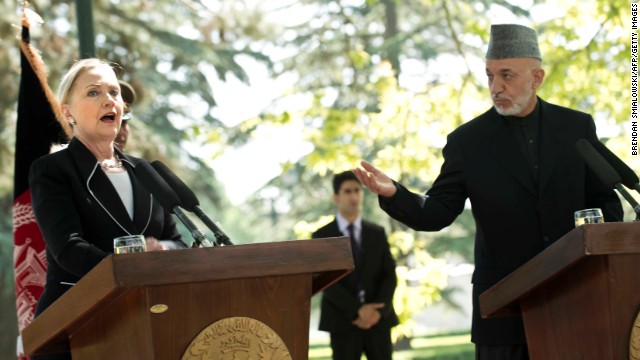 Clinton speaks as Afghanistan President Hamid Karzai listens during a news conference at the presidential palace in Kabul, Afghanistan, on July 7, 2012.
Clinton speaks as Afghanistan President Hamid Karzai listens during a news conference at the presidential palace in Kabul, Afghanistan, on July 7, 2012.  Clinton arrives at Ben Gurion International Airport in Israel on July 15, 2012.
Clinton arrives at Ben Gurion International Airport in Israel on July 15, 2012.  Clinton looks on as Obama makes a statement in response to the attack at the U.S. Consulate in Libya on September 12, 2012.
Clinton looks on as Obama makes a statement in response to the attack at the U.S. Consulate in Libya on September 12, 2012.  Clinton applauds Myanmar opposition leader Aung San Suu Kyi during a ceremony where Suu Kyi was presented with the Congressional Gold Medal on September 19, 2012.
Clinton applauds Myanmar opposition leader Aung San Suu Kyi during a ceremony where Suu Kyi was presented with the Congressional Gold Medal on September 19, 2012.  Bill Clinton kisses his wife after introducing her at the Clinton Global Initiative annual meeting on September 24, 2012, in New York City.
Bill Clinton kisses his wife after introducing her at the Clinton Global Initiative annual meeting on September 24, 2012, in New York City. 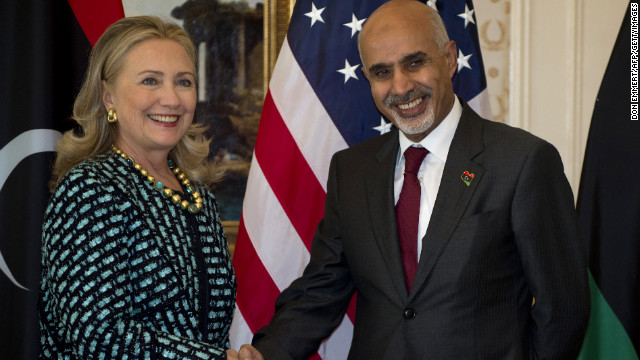 Clinton shakes hands with Libyan President Mohamed Magariaf on September 24, 2012, in New York.
Clinton shakes hands with Libyan President Mohamed Magariaf on September 24, 2012, in New York.  Clinton stands during a news conference following meetings at the prime minister's office in Pristina, Kosovo, on October 31, 2012. Clinton said that Kosovo's unilaterally declared independence, fiercely opposed by Serbia, was "not up for discussion."
Clinton stands during a news conference following meetings at the prime minister's office in Pristina, Kosovo, on October 31, 2012. Clinton said that Kosovo's unilaterally declared independence, fiercely opposed by Serbia, was "not up for discussion."  Clinton chats with Suu Kyi before Obama speaks at the University of Yangon in Yangon, Myanmar, on November 19, 2012.
Clinton chats with Suu Kyi before Obama speaks at the University of Yangon in Yangon, Myanmar, on November 19, 2012.  Obama looks at Clinton before the start of a bilateral meeting with Japanese Prime Minister Yoshihiko Noda, far right, during the East Asian Summit in Phnom Penh, Cambodia, on November 20, 2012.
Obama looks at Clinton before the start of a bilateral meeting with Japanese Prime Minister Yoshihiko Noda, far right, during the East Asian Summit in Phnom Penh, Cambodia, on November 20, 2012.  Israeli Prime Minister Benjamin Netanyahu shakes hands with Clinton at the prime minister's office November 20, 2012, in Jerusalem.
Israeli Prime Minister Benjamin Netanyahu shakes hands with Clinton at the prime minister's office November 20, 2012, in Jerusalem.  Clinton receives a sports jersey and football helmet from Deputy Secretary Tom Nides, center, after returning to work on January 7, 2013, following a fall where she hit her head and doctors later detected a blood clot. The number 112 represented the number of countries that she had visited as secretary of state.
Clinton receives a sports jersey and football helmet from Deputy Secretary Tom Nides, center, after returning to work on January 7, 2013, following a fall where she hit her head and doctors later detected a blood clot. The number 112 represented the number of countries that she had visited as secretary of state. 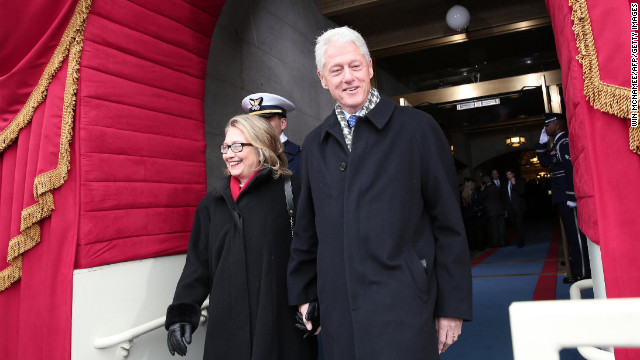 Clinton and her husband arrive for the inauguration for Obama's second term on January 21, 2013.
Clinton and her husband arrive for the inauguration for Obama's second term on January 21, 2013.  Clinton testifies before the Senate Foreign Relations Committee on Capitol Hill on January 23, 2013. Lawmakers questioned Clinton about the security failures during the Benghazi, Libya, attacks that led to the death of four Americans, including U.S. Ambassador Christopher Stevens.
Clinton testifies before the Senate Foreign Relations Committee on Capitol Hill on January 23, 2013. Lawmakers questioned Clinton about the security failures during the Benghazi, Libya, attacks that led to the death of four Americans, including U.S. Ambassador Christopher Stevens.  From left, first lady Michelle Obama stands with former first ladies Laura Bush, Clinton, Barbara Bush and Rosalynn Carter at the opening ceremony of the George W. Bush Presidential Center in Dallas on April 25, 2013.
From left, first lady Michelle Obama stands with former first ladies Laura Bush, Clinton, Barbara Bush and Rosalynn Carter at the opening ceremony of the George W. Bush Presidential Center in Dallas on April 25, 2013.  From left, Clinton, former first lady Laura Bush and former Presidents Bill Clinton and George W. Bush listen to speakers during the memorial service for Nelson Mandela in Soweto, South Africa, on December 10.
From left, Clinton, former first lady Laura Bush and former Presidents Bill Clinton and George W. Bush listen to speakers during the memorial service for Nelson Mandela in Soweto, South Africa, on December 10.  Clinton ducks after a woman threw a shoe at her while she was delivering remarks at the Institute of Scrap Recycling Industries conference in Las Vegas on April 10.
Clinton ducks after a woman threw a shoe at her while she was delivering remarks at the Institute of Scrap Recycling Industries conference in Las Vegas on April 10.  Clinton tours the National September 11 Memorial & Museum in New York with President Barack Obama, former New York Mayor Michael Bloomberg, first lady Michelle Obama and former President Clinton on May 15.
Clinton tours the National September 11 Memorial & Museum in New York with President Barack Obama, former New York Mayor Michael Bloomberg, first lady Michelle Obama and former President Clinton on May 15.  Hillary Clinton talks with ABC News anchor Diane Sawyer on Thursday, June 5, for her first television interview in conjunction with the release of her new book.
Hillary Clinton talks with ABC News anchor Diane Sawyer on Thursday, June 5, for her first television interview in conjunction with the release of her new book.
- Julian Zelizer: Hillary Clinton's comment about being "dead broke" landed with a thud
- He says gaffes tend to drive a lot of media coverage of politicians
- Vast majority of gaffes don't have a significant lasting impact, he says
- Zelizer: When gaffes do matter, it's because they reinforce perceptions of candidate's flaws
Editor's note: Julian Zelizer is a professor of history and public affairs at Princeton University. He is the author of "Jimmy Carter" and "Governing America." The opinions expressed in this commentary are solely those of the author.
(CNN) -- Hillary Clinton's book rollout hit some speed bumps last week. She took some partisan heat for a comment that she recently made to ABC's Diane Sawyer. Clinton explained that she and her husband were "dead broke" when they left the White House because of the legal fees they faced. Her critics instantly jumped on the statement, pointing to these words as evidence that she was out of touch with average Americans.
It could be seen as the first major gaffe in a campaign for president in 2016 that has not even begun. Her opponents argued that the statement was disingenuous, given the kind of money the Clintons have earned, and showed that she lacked a kind of veracity.
As Robin Abcarian wrote in the Los Angeles Times: "Here is an iron-clad rule of American politics: If you are a millionaire with multiple houses, never, under any circumstances, discuss your financial struggles. You don't have any financial struggles." Clinton clarified the comment, saying she and Bill Clinton were "obviously blessed" and that "I fully appreciate how hard life is so for many Americans today."
In another exchange that drew notice, an NPR interview with Terry Gross, the popular host of "Fresh Air," Clinton was clearly testy and sharp when the host asked her why it took so long for her to come out in favor of same-sex marriage.
Gaffes are a major part of the political game. Gaffes are moments when a candidate slips, and the slip explodes into a major story that might harm a candidacy. They have been a central feature in the age of televised campaigns since the 1960s. Reporters cover campaigns like horse races, more interested in the apparent ups and downs of each candidate than they are in the broader economic and political forces shaping elections or in the big public policy questions of the day.
Gergen: Republicans play into Hillary's hands
 Clarifying 'dead broke' comment
Clarifying 'dead broke' comment  Clinton talks personal finance, Lewinsky
Clinton talks personal finance, Lewinsky Gaffes play well in this kind of coverage because they offer instances when it seems as if there will be a dramatic shift in which horse has the lead. As Jonathan Chait wrote in New York magazine: "(S)ince very little changes in the horse race from day to day, the main device they (reporters) have to drive the narrative is the gaffe. The gaffe is a candidate saying something unplanned and unwelcome. As campaign reporters define their job, the gaffe is the primary form of 'news.'"
Clinton joins a long line of candidates who have made these kinds of mistakes. There are different kinds of gaffes, which is probably what helps make them interesting to some.

 Rep. Todd Akin's statement that a woman's body is capable of preventing pregnancy in cases of "legitimate rape" was so outrageous that even Mitt Romney quickly denounced him, says Dean Obeidallah. But the Akin gaffe may end up infecting Romney's campaign.
Rep. Todd Akin's statement that a woman's body is capable of preventing pregnancy in cases of "legitimate rape" was so outrageous that even Mitt Romney quickly denounced him, says Dean Obeidallah. But the Akin gaffe may end up infecting Romney's campaign. 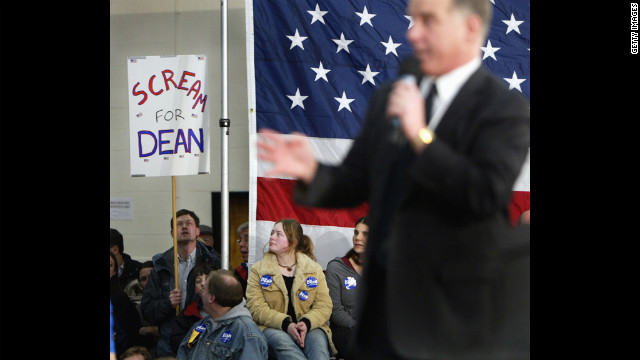 As he tried to fire up the crowd after his third-place finish in the Iowa caucuses in 2004, a hoarse Howard Dean let out a yell that played very loud on TV. His "I Have a Scream" speech was seen by some as unpresidential and was widely mocked.
As he tried to fire up the crowd after his third-place finish in the Iowa caucuses in 2004, a hoarse Howard Dean let out a yell that played very loud on TV. His "I Have a Scream" speech was seen by some as unpresidential and was widely mocked.  In 1990, Texas Republican gubernatorial candidate Clayton Williams was leading his Democratic opponent, Ann Richards, by 11 points less than three months before Election Day. Then he uttered a wisecrack comparing bad weather and rape: "If it's inevitable, just relax and enjoy it.'' He lost by 2 percentage points.
In 1990, Texas Republican gubernatorial candidate Clayton Williams was leading his Democratic opponent, Ann Richards, by 11 points less than three months before Election Day. Then he uttered a wisecrack comparing bad weather and rape: "If it's inevitable, just relax and enjoy it.'' He lost by 2 percentage points.  George Romney (Mitt's father) opposed the Vietnam War during his presidential run, although he had previously supported it. In explaining his change of heart, he said that in 1965, he visited Southeast Asia and met with U.S. generals who "brainwashed" him into supporting the war. His candidacy could not recover.
George Romney (Mitt's father) opposed the Vietnam War during his presidential run, although he had previously supported it. In explaining his change of heart, he said that in 1965, he visited Southeast Asia and met with U.S. generals who "brainwashed" him into supporting the war. His candidacy could not recover.  In 1972, Sen. Edmund Muskie was a leading candidate for the Democratic presidential nomination. But his candidacy came apart when the press reported that he had "tears streaming down his face" as he defended against attacks on his wife and himself by the publisher of a New Hampshire newspaper. Muskie said they were snowflakes, but his calm image was damaged.
In 1972, Sen. Edmund Muskie was a leading candidate for the Democratic presidential nomination. But his candidacy came apart when the press reported that he had "tears streaming down his face" as he defended against attacks on his wife and himself by the publisher of a New Hampshire newspaper. Muskie said they were snowflakes, but his calm image was damaged.  Republican Sen. George Allen publicly used the racially derogatory term "macaca" to describe a staff member of his opponent's campaign who was of Indian heritage. Allen had been leading in the polls at the time but went on to lose that 2006 election.
Republican Sen. George Allen publicly used the racially derogatory term "macaca" to describe a staff member of his opponent's campaign who was of Indian heritage. Allen had been leading in the polls at the time but went on to lose that 2006 election.  A gallery of gaffes
A gallery of gaffes There are gaffes where candidates make statements that just sound wrong, raising questions about their intelligence and political acumen. In 1967, the charismatic and dashing Michigan Gov. George Romney justified his initial support of Vietnam to a reporter as a result of "brainwashing" by the military during a visit to Vietnam. The statement, meant to explain the propaganda that many Americans had been hearing, came across as someone who lived in the world of movies rather than the world of politics.
During a 1976 debate with Democrat Jimmy Carter, Republican President Gerald Ford said, "There is no Soviet domination of Eastern Europe." The statement was meant to show that the president didn't agree with conservative critics who said his foreign policy detente -- easing relations with the Soviet Union -- indicated an acceptance of communism. But it came off as if he didn't know much about foreign policy.
Vice presidential candidate Sarah Palin made an endless series of these kinds of gaffes in television interviews in 2008 with Katie Couric, when she seemed to have trouble explaining some very basic facts about foreign or domestic policy. When Couric asked her about statements that Alaska's proximity to Russia was evidence of her foreign policy expertise, Palin said, "Our next-door neighbors are foreign countries, there in the state that I am in the executive of." She added, "As Putin rears his head and comes into the airspace of the United States of America, where do they go? It's Alaska."
Then there are those gaffes where a candidate says something that just falls flat, even if it is not necessarily inaccurate. In 1988, Democratic candidate Michael Dukakis responded to a question about whether he would want the death penalty if his wife was raped and murdered. He said, "I think you know that I've opposed the death penalty all of my life." Although the Massachusetts governor was trying to demonstrate his commitment to this policy position, his response seemed cold and distant.
In 2000, Vice President Al Gore claimed responsibility for having helped to invent the Internet. Republicans went to town, using this as evidence that Gore was willing to say anything, though the vice president was referring to his involvement with legislation that was actually vital in the evolution of modern communications technology.
Sometimes a statement plays into negative perceptions that voters have about a candidate. At a supermarket visit during the 1992 campaign, George H.W. Bush's words made him appear stunned by a electronic scanner, conveying the impression that he was out of touch with average Americans. (The White House claimed he was just impressed with a new kind of scanner.) He also admitted during a debate that he didn't know the price of milk.
When events change, a statement that seems reasonable at one moment can appear devastating the next. In 1972, Democrat George McGovern said that he was "one thousand percent" behind his running mate Thomas Eagleton, after Eagleton revealed that he had received electric shock treatment. But McGovern's team soon felt it was necessary to drop Eagleton from the ticket, making the statement seem quite problematic. Democrats pounced on Sen. John McCain in 2008 for saying that the fundamentals of the economy were sound as the financial markets imploded in the middle of the campaign.
There are also physical gaffes, which are less about what candidates say than about how they look. When Democrat Edwin Muskie appeared to be crying as he responded to unfavorable stories about his wife in 1972, the perception of weakness seemed to harm his front-runner status.
When Ford, a former college football player, stumbled on the stairs of an airplane, the fall became the butt of a joke on "Saturday Night Live" that came to symbolize his clumsiness. (Lyndon Johnson had always joked that Ford, then in the House, could not "fart and chew gum at the same time.")
When Dukakis wore a military helmet in a photo op, sitting in a tank, to show his support for the military, Republicans used this awkward image to highlight his weakness on defense.
When Bush glanced at his watch in the middle of a debate with Bill Clinton in 1992, it showed a president who was not engaged with the entire campaign. When Vermont Gov. Howard Dean yelled enthusiastically after a third place finish in Iowa in 2004, the clip was shown again and again and used as evidence that he was somehow unstable.
When Massachusetts Democrat John Kerry went windsurfing off Nantucket, with his sailboard twisting and turning different ways with the wind, Republicans played the image as evidence that he goes back and forth on the issues. "John Kerry, whichever way the wind blows," the narrator says. In a 2000 debate, Gore's entire physical demeanor -- the way he walked toward George W. Bush at one point in the debate and frequently sighed -- conveyed a kind of arrogance that played into perceptions of him as an aloof East Coast liberal.
There are also the gaffes when candidates are caught saying something that was not meant to be public. When an iPhone user captured Mitt Romney at a 2012 fund-raiser talking about the "47%" of Americans who were dependent on government and don't pay taxes and wouldn't support him, it was used as an example of his elitism. When Sen. George Allen of Virginia in 2006 used the racial slur a "macaca" while someone was taping him, some said it instantly tanked his candidacy.
Gaffes become devastating only when they play into deeper weaknesses in a candidate that were there regardless of the missteps themselves.
Julian Zelizer
But do these gaffes really matter? Do they turn a campaign? According to a recent book by the political scientists John Sides and Lynn Vavreck, "The Gamble," journalists tend to greatly overstate how important gaffes are. The fundamentals of campaigns -- the state of the economy, fund-raising capacity, endorsements -- are in the end much more important than moments like these, which seem big at the time.
"Many a news cycle," Sides wrote in his blog, "was built on a 'gaffe' with a remarkably short shelf life." When Barack Obama was recorded in the middle of the 2008 primaries making a statement about Americans who cling to their guns and religion, it stimulated a feeding frenzy but didn't kill his candidacy.
Given the fast-paced nature of the modern press, the odds are that stories will die very quickly. So if a candidate can hold on long enough, the frenzy around a gaffe will probably disappear.
The way in which gaffes usually matter has less to do with make-or-break moments than with how they help to build a broader narrative about how voters view a candidate. Gaffes become devastating only when they play into deeper weaknesses in a candidate that were there regardless of the missteps themselves.
The gaffe can also become damaging as a very small piece of a larger story that Americans develop about a specific candidate. The biggest risk from a statement like Hillary Clinton's has to do with concerns about how genuine she is and whether she is more a product of Washington than Main Street. This will certainly be a story that her opponents will repeat in months to come.
But, at this point, she shouldn't worry too much that this gaffe will matter. Usually candidates survive these stumbles. Clinton brings a tremendous amount to the table, in terms of her support among core Democrats and female voters and her experience in the White House, Senate and at the State Department. If she can continue to build on those assets and meld them into a first-rate campaign, this statement will be quickly forgotten.
Follow us on Twitter @CNNOpinion.
Join us on Facebook/CNNOpinion.
No comments:
Post a Comment